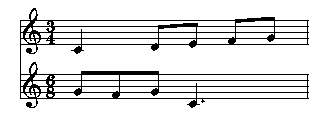<-- previous page Table of Contents next page -->
Once in a while, music is written with different
time signatures
on different staffs. Mup does not support this directly,
but it is possible to simulate it
for the case where the time signatures reduce to the same value, for example,
3/4 and 6/8 time (since 6/8 taken as a fraction and reduced to lowest terms
is 3/4). You can make the output use both 3/4 and 6/8 by using a non-printing
time signature, then placing the time signatures manually.
Here is an example of how to do that:
score // set time signature to 3/4 but don't print it time=3/4n staffs=2 staff 1 // We want this staff to be in 3/4 time, // so beam things in groups of // quarter note times. beamstyle=4,4,4 staff 2 // We want this staff to effectively be // in 6/8 time, so we'll beam things // in groups of dotted quarters. beamstyle=4., 4. // In real 6/8 time, the time unit would // be eighth note, so make that the default timeunit=8 music // Add padding to the first chord on at least one // of the staffs, to make room for the manually placed // time signatures, and set location tags 1: [pad 5; =t] c; 8d; e; f; g; 2: [=s] g; f; g; 4.c; // Manually place the time signatures // They are printed in 16-point newcentury bold font, // relative to the location tags that were set. // First print the 3/4 print (t.w - 4, t.y) "\f(newcentury bold)\s(16)3"; print (t.w - 4, t.y - 4) "\f(newcentury bold)\s(16)4"; // Then print the 6/8 print (t.w - 4, s.y) "\f(newcentury bold)\s(16)6"; print (t.w - 4, s.y - 4) "\f(newcentury bold)\s(16)8"; bar
